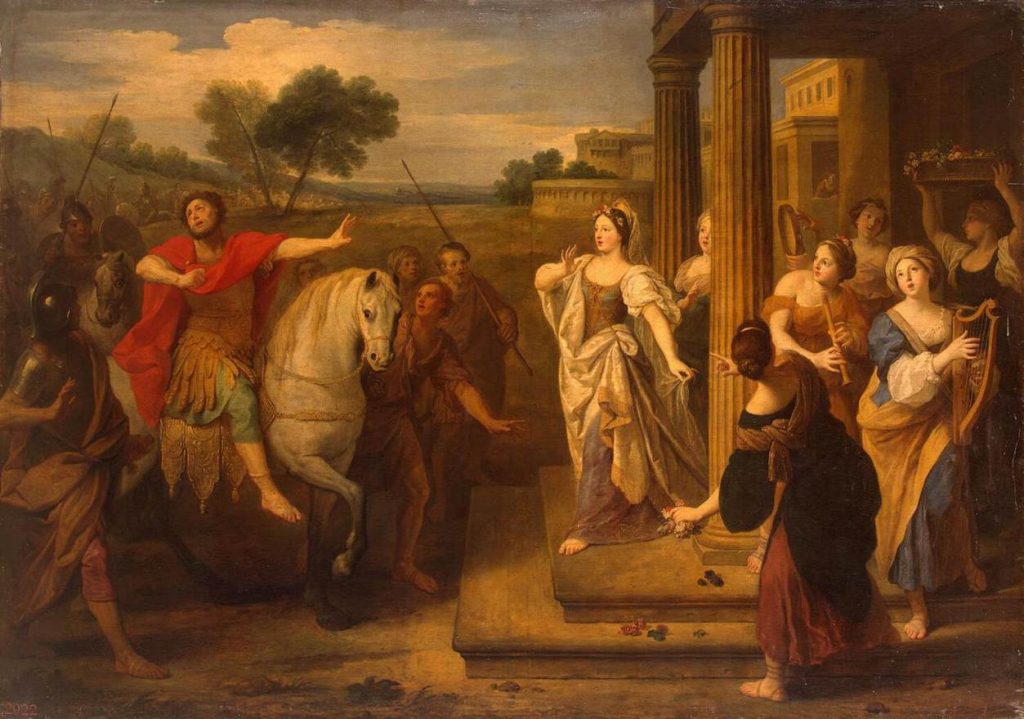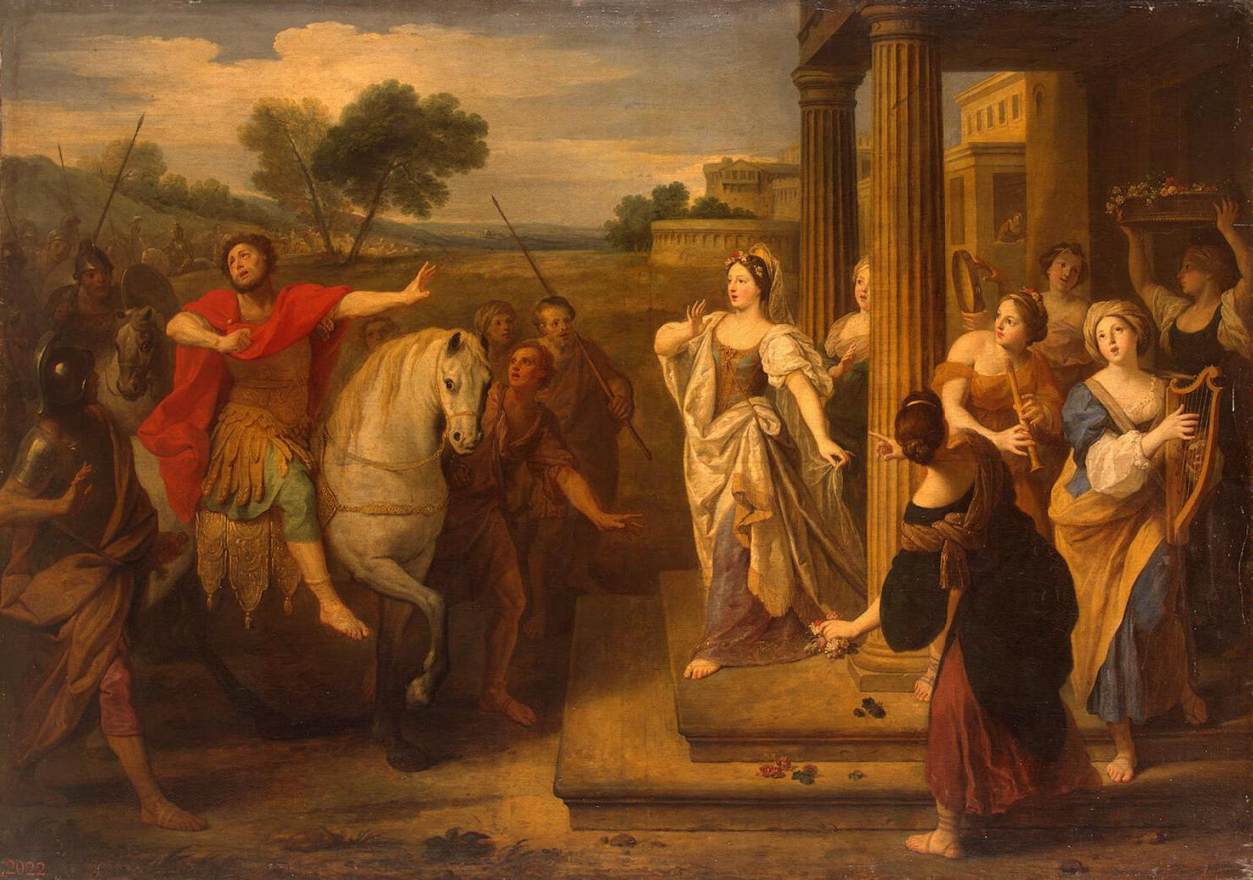
Jephthah (pronounced /ˈdʒɛfθə/; Hebrew: יִפְתָּח, Yīftāḥ, “opened,” or “opener,” probably signifying “Yahweh will open”), was the ninth Judge who presided over Israel for a period of six years (Judges 12:7), following the leadership of Jair. His account is recorded in Judges 11:1-12:7.
A Son of Prostitute and an Outlaw King
Jephthah lived in Gilead, on the east side of the River Jordan. His father’s name is also given as Gilead, and, as his mother is described as a prostitute, this may indicate that his father might have been any of the men of that area.[1] (Judges 11:1)
His father having several other children by his lawful wife, they conspired to expel Jephthah from among them, insisting that he who was the son of a strange woman should have no part of the inheritance with them. (Judges 11:2)
Like Ishmael, therefore, he withdrew, and took up his residence beyond Jordan, in the land of Tob, where he appears to have become the chief of a banditti, or marauding party, who probably lived by plunder, Judges 11:3.
Battle Against Ammonites
The Israelites “again did what was evil in the sight of the Lord … they forsook the Lord and did not serve him. So the anger of the Lord was kindled against Israel, and he sold them into the hand of the Philistines and into the hand of the Ammonites …”. Judges 10:6-7
In process of time, a war broke out between the Ammonites and the children of Israel who inhabited the country beyond Jordan. The elders of Gilead ask him to be their leader in the campaign against the Ammonites, but he holds out for a more permanent and a broader position, and the elders agree that, provided Jephthah succeeds in defeating Ammon, he will be their permanent chieftain. Judges 11:4-11.
As soon as Jephthah was invested with the command of the Israelites he sent a deputation to the Ammonites, demanding to know on what principle the latter had taken up arms against them. They answered that it was to recover the territory which the former had taken from them on their first coming out of Egypt. Jephthah replied that they had made no conquests in that quarter but from the Amorites; adding, “If you think you have a right to all that Chemosh, your god, hath given you, why should not we possess all that the Lord our God hath conferred on us by right of conquest?” Jephthah’s reasoning availed nothing with the Ammonites; and as the latter persisted in waging war, the former collected his troops together and put himself at their head. Judges 11:12-28.
The Spirit of the Lord is said to have now come upon Jephthah (Judges 11:29); by which we are here to understand, that the Lord endowed him with a spirit of valor and fortitude (Judges 11:1), adequate to the exigence of the situation in which he was placed, animating him with courage for the battle, and especially inspired him with unshaken confidence in the God of the armies of Israel.
Jephthah’s Tragic Vow
Jephthah at this time made a vow to the Lord that if he delivered the Ammonites into his hand, whatever came forth out of the doors of his house to meet him when he returned should be the Lord’s; Jephthah swears an oath:
“. . . and whatever [footnote: Or whoever] comes out from the doors of my house to meet me when I return in peace from the Ammonites shall be the LORD’s, and I will offer it [footnote: Or him] up for a burnt offering. – Judges 11:31, ESV
The battle terminated auspiciously for Jephthah; the Ammonites were defeated, and the Israelites ravaged their country. Judges 11:32-33
But on returning toward his own house, his daughter, an only child, came out to meet her father with tambourines and dances, accompanied by a chorus of virgins, to celebrate his victory. On seeing her, Jephthah rent his clothes, and said, “Alas, my daughter! thou hast brought me very low; for I have opened my mouth to the Lord, and cannot go back.” His daughter intimated her readiness to accede to any vow he might have made in which she was personally interested; only claiming a respite of two months, during which she might go up to the mountains and bewail her virginity with her companions. Jephthah yielded to this request, and at the end of two months, according to the opinion of many, her father offered her up in sacrifice, as a burnt-offering to the Lord, Judges 11:34-39.
The story ends by recounting how “the daughters of Israel went year by year to lament the daughter of Jephthah, the Gileadite, four days in the year”.
Later, Jephthah was forced to fight against the Ephraimites, who refused to aid him in his struggle against the Ammonites. The story is remembered for the killing of the fugitive Ephraimites who were identified by their accent; they said the Hebrew word shibboleth as sibboleth. ” At that time 42,000 of the Ephraimites fell” (Judges 12:5–6).
Jephthah is referenced once in Hebrews 11:32 where he is commended for his faith.
References:
- Bohmbach, Karla (2009). “Daughter of Jephthah: Bible”. Jewish Women’s Archive.
- Wikipedia https://en.wikipedia.org/wiki/Jephthah
- https://en.wikipedia.org/wiki/Jephthah
